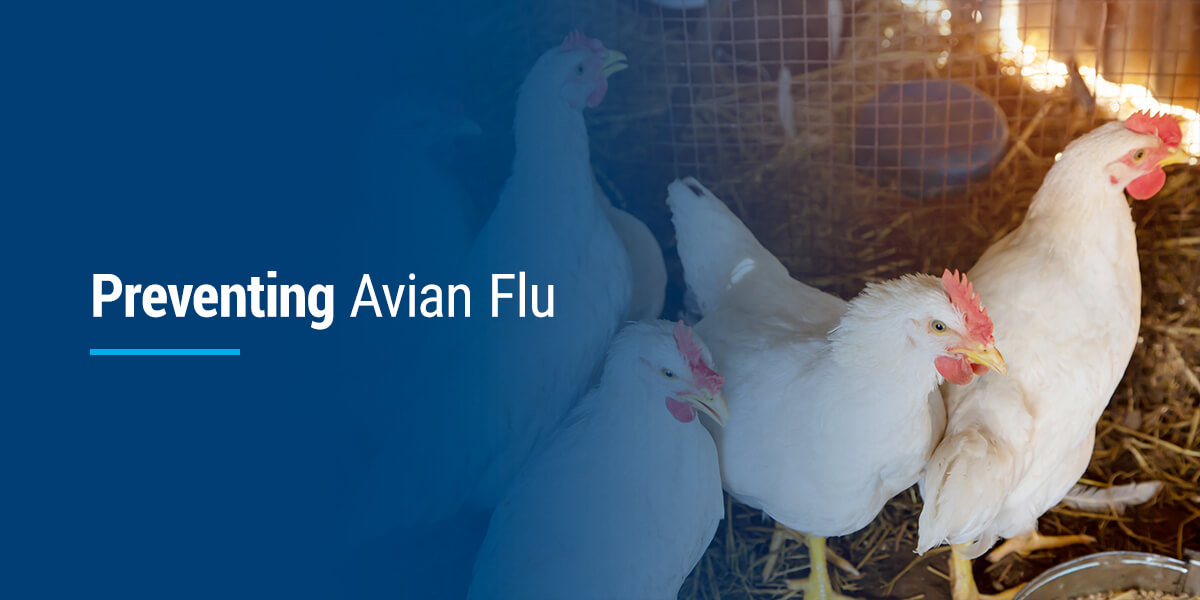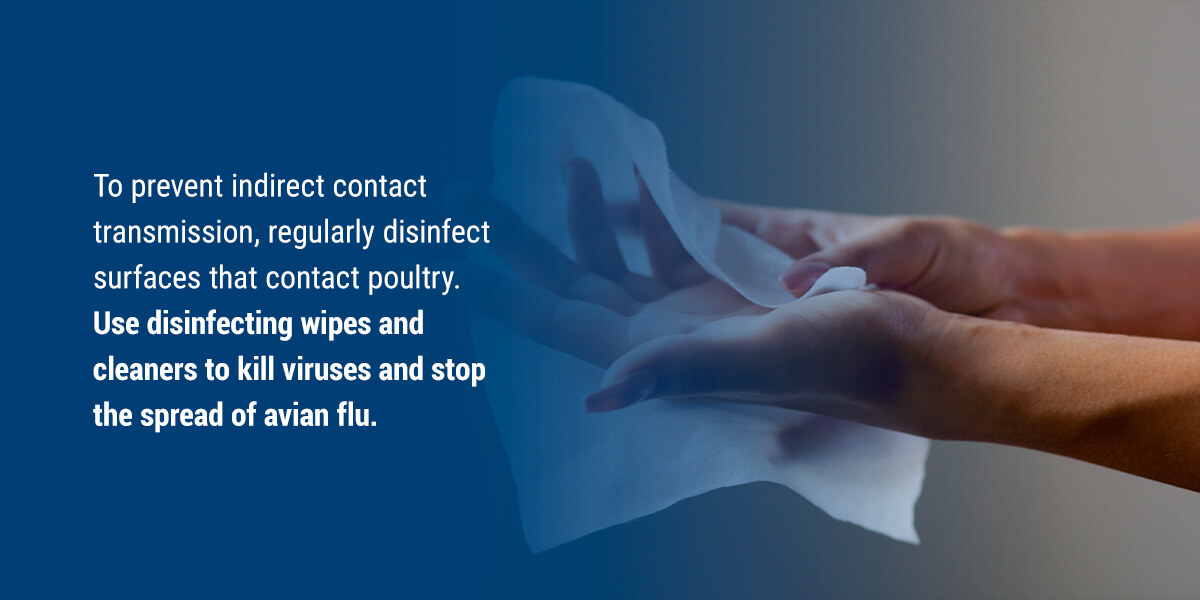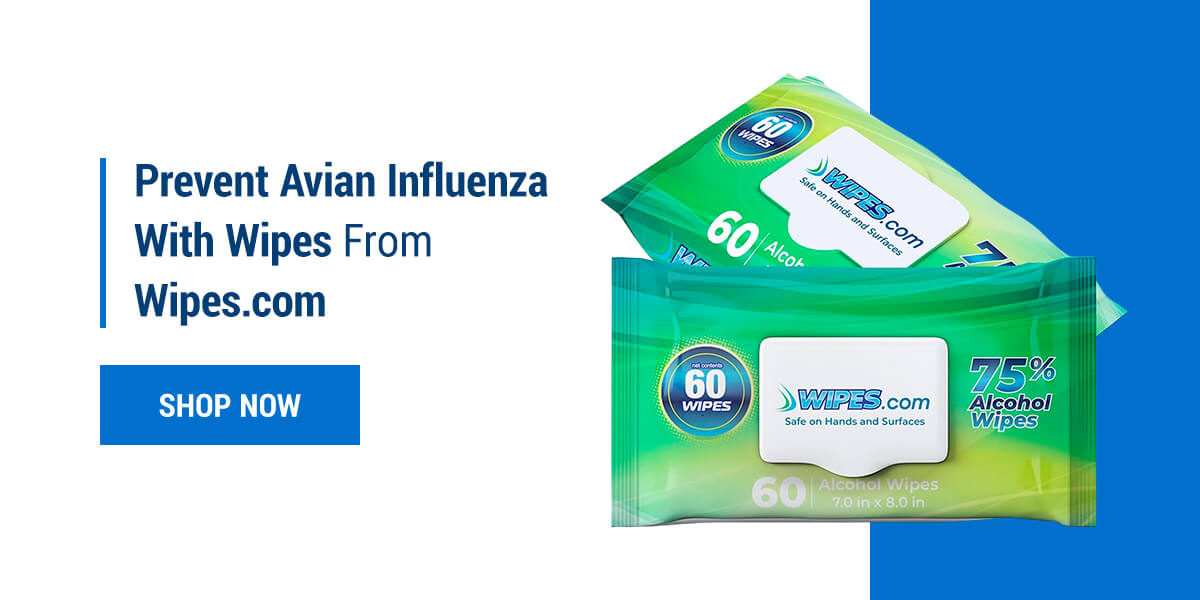Bird Flu Prevention: All You Need to Know | Wipes.com

A Comprehensive Guide For Bird Flu Prevention
If you're a bird owner, keeping your poultry safe and healthy is one of your top priorities. Birds can become sick due to exposure, parasites and bacteria, but they are also susceptible to dangerous viruses. Preventing avian flu through proper biosecurity helps keep your birds strong and safe. Learn about how to prevent bird flu and ensure your flock stays protected and healthy.
What You Need to Know About Avian Flu
Understanding this virus can help you with bird flu prevention. The more you know about avian flu, the better you can protect your poultry and stop the spread before it starts.
What Is Avian Flu?
Avian influenza, also known as bird flu, is a respiratory disease that affects birds. Caused by Influenza A viruses, severe strains can have 90%-100% mortality rates in chickens. Wild birds like shorebirds, gulls and ducks carry bird flu and can spread the virus without showing signs of illness. Avian influenza can quickly spread and become lethal once passed to domesticated birds like ducks, geese, chickens and turkeys.
There are two categories of bird flu — low pathogenicity avian influenza (LPAI) A viruses and highly pathogenic avian influenza (HPAI) A viruses. Each one affects birds differently based on their molecular makeup and how contagious they are. LPAI viruses are mostly asymptomatic or cause minor symptoms but can mutate into HPAI viruses. HPAI viruses are incredibly deadly and contagious to poultry.
How Does It Spread?
Avian influenza prevention starts with understanding how the virus spreads. The bird flu virus travels in multiple ways, and it can spread through both direct and indirect contact. Once the flu reaches a domesticated bird, it can spread quickly, infecting the flock. HPAI viruses that infect a domestic flock can jump back to wild birds, carrying it off and distributing it further. Ways for avian flu to spread include:
- Direct contact: Bird flu can spread through direct bird-to-bird exposure. Infected wild or domesticated birds in contact with poultry will spread the disease.
- Indirect contact: Another form of spread is indirect contact. Poultry can get avian flu from contact with contaminated sources. Crates, egg trays, manure, feed, water, farming materials and equipment with the virus can spread it to poultry. Additionally, people can give it to burds through contaminated shoes, clothing and hands.
How to Prevent Avian Flu
Since bird flu can spread through direct and indirect contact, you must limit points of contact with wildlife and potential exposure. Practice thorough disinfection and prevent wildlife from accessing poultry and poultry equipment. Your best chance at reducing losses from bird flu is to stop it from ever infecting your birds in the first place. Take steps to minimize exposure and contact points to keep poultry healthy and flu-free.
Limit Visitors
Stop avian flu spread by limiting visitor access to your property. Keep any visitors from coming in contact with your flock, or have them take extra precautionary measures when visiting. Reduce your chances of picking up the virus by staying away from other poultry farms and bird owners. Isolating your poultry from contact with other people's farms will help lower the chances of picking up avian flu from other domesticated animals.
If you have to visit other farms or bird owners, take steps to keep yourself free of any virus traces. Scrub your boots and wash your hands well with soap before and after visiting birds. Use disposable coveralls and boot covers to help prevent carrying the virus to your birds.
Keep Wildlife Away
Stop wildlife from contacting your poultry and equipment to reduce the chances of contamination. Wild birds and mammals may carry avian influenza, infecting livestock through contact or contaminating food and equipment. Keep rodents and wild birds out of poultry coops and housing. Ensure you and your flock have no contact with wild birds or waterfowl. Installing exclusionary netting, screens and deterrents can keep wildlife separated from your birds.
Secure poultry equipment against contamination as well. Reducing exposed material and eliminating draws for wildlife will help reduce the number of animals coming up to your flock. To deter wildlife, remove standing water, cover waste and secure feed bins and water. Keep your birds inside during high-risk periods to further protect against flu spread.
Wash Your Hands
Ensure you're clean of any avian flu traces by washing your hands thoroughly before and after dealing with birds. Wear disposable boot covers and coveralls when working with your poultry — dispose of them properly after each use. This helps keep virus traces from traveling to poultry and other surfaces on your clothes.
When preparing to be near birds and when leaving bird areas, wash hands with soap for at least 20 seconds to remove possible contamination. Scrub under nails, between fingers and all over the front and back of your hands. If your hands are only slightly dirty, you can use disinfecting wipes approved by the Environmental Protection Agency (EPA) to kill viruses.

Disinfect Surfaces, Buildings and Everything Else
To prevent indirect contact transmission, regularly disinfect surfaces that contact poultry. Use disinfecting wipes and cleaners to kill viruses and stop the spread of avian flu. Disinfect crates, tires, shoes, clothes, handles, egg trays and flats and anything else that poultry is near or touches. Once surfaces and buildings are clean, keep them secured to prevent wild birds and animals from getting into them.
To clean surfaces, first brush all dirt, feces, debris, dust, litter and feed from the area. Use a dry broom to sweep all loose particles off. Dirt and debris can prevent disinfectants from working correctly, so clear them away before washing. Remove all equipment from the area and clean it separately to avoid contamination. Thoroughly soak and wash all surfaces with a water and detergent or sanitizing solution. Once you have washed and soaked everything, rise it with clean, low-pressure water.
Clean and disinfect poultry equipment, and carefully disinfect poultry buildings and surfaces. Since avian flu can transfer to birds from contaminated surfaces, you must regularly disinfect structures and areas. Any contaminated sites that contact poultry could infect the flock.
Always use EPA-approved disinfectants to eliminate avian influenza to ensure you're sufficiently fighting the virus. Disinfecting wipes are a practical, convenient choice when working to kill the virus. Disinfecting wipes are not safe to use directly on animals but are a safe and effective tool for killing viruses on equipment and surfaces. Gently wiping down equipment with disinfecting wipes can help kill avian flu and prevent its spread.
Killing avian flu requires strong bases or acids, dryness and heat. Effective disinfectants may have harsh or dangerous chemicals, so always carefully read and follow the instructions to protect the health of you and your poultry. Bleach is a robust and reliable solution for disinfection, but it can also cause irritation and severe reactions. For the safest cleaning with wipes, choose a disinfecting wipe without bleach to kill the avian flu virus without worrying about bleach safety concerns.
Regularly disinfect equipment to remove any possible traces of avian flu. To help further reduce its spread, always purchase healthy birds from reputable sources. Isolate new birds for 30 days to watch for illnesses before introducing them to your flock. When handling new birds, follow the same disinfecting and washing procedures before and after to keep potential viruses from reaching your poultry.
Even when you practice proper avian flu prevention, your flock can still become infected. If your birds are infected by wildlife or get the virus from some other contact, always report sick and dead poultry to your local agricultural office, veterinarian or other animal health resource. Containing and treating the spread of avian flu is essential, so keep local authorities updated and reach out for assistance in dealing with the virus.
Prevent Avian Influenza With Wipes From Wipes.com
Protect your poultry from bird flu with disinfecting wipes from Wipes.com. Our high-quality disinfecting wipes are EPA-approved for killing avian flu in 30 seconds. Ensure you're cleaning your surfaces with the most effective tools possible and keep your birds safe from the influenza virus quickly and conveniently. Shop our selection of disinfecting wipes now, or contact us for information on custom orders today.
Recent Posts
-
How to Sell Gym Memberships Effectively (and Why a Clean Facility is Your Secret Weapon)
Introduction: The New Age of Fitness Membership Sales Selling gym memberships is no longer about ju …12th May 2025 -
The Clean Office Advantage
The Clean Office Advantage: How a Tidy Workplace Boosts Productivity, Happiness, and Safety In today …16th Apr 2025 -
Jake and Lisa discuss H1N1 vs H5N1...
Jake: Hey, Lisa! I was just reading about influenza viruses, and I came across H1N1 and H5N1. I know …6th Feb 2025

